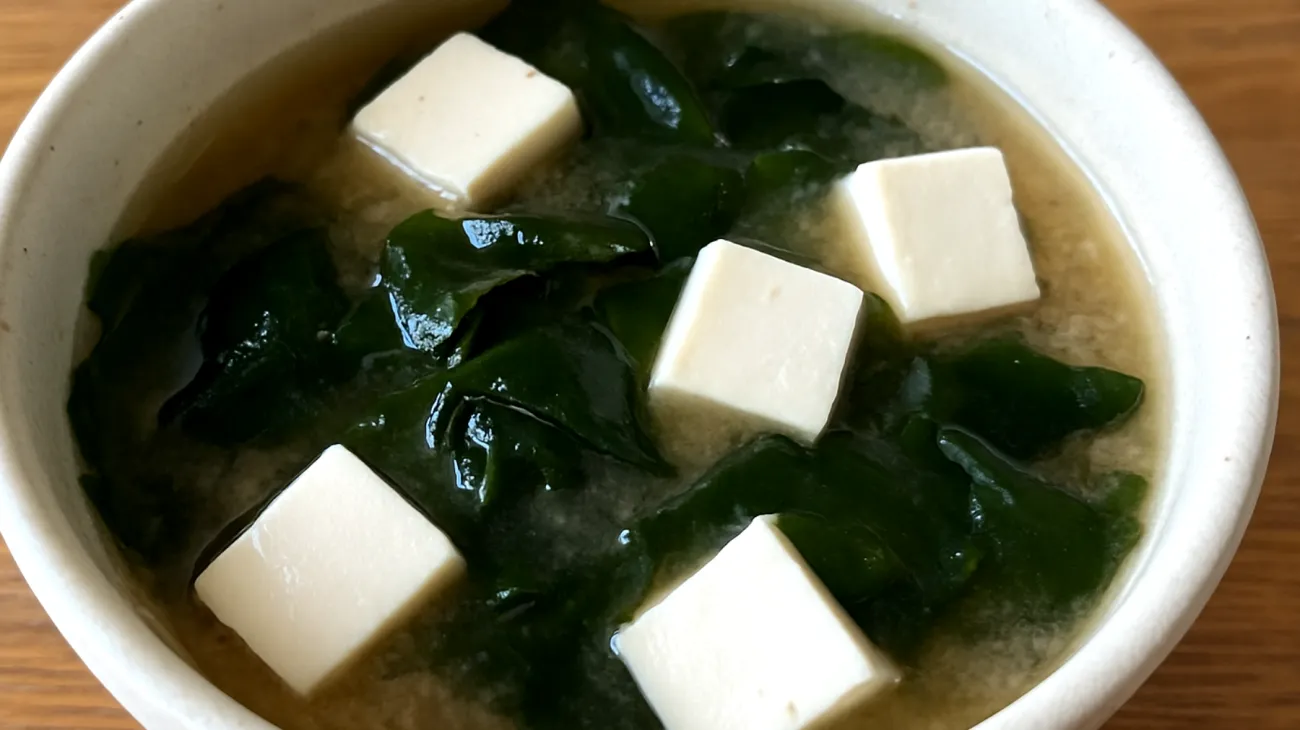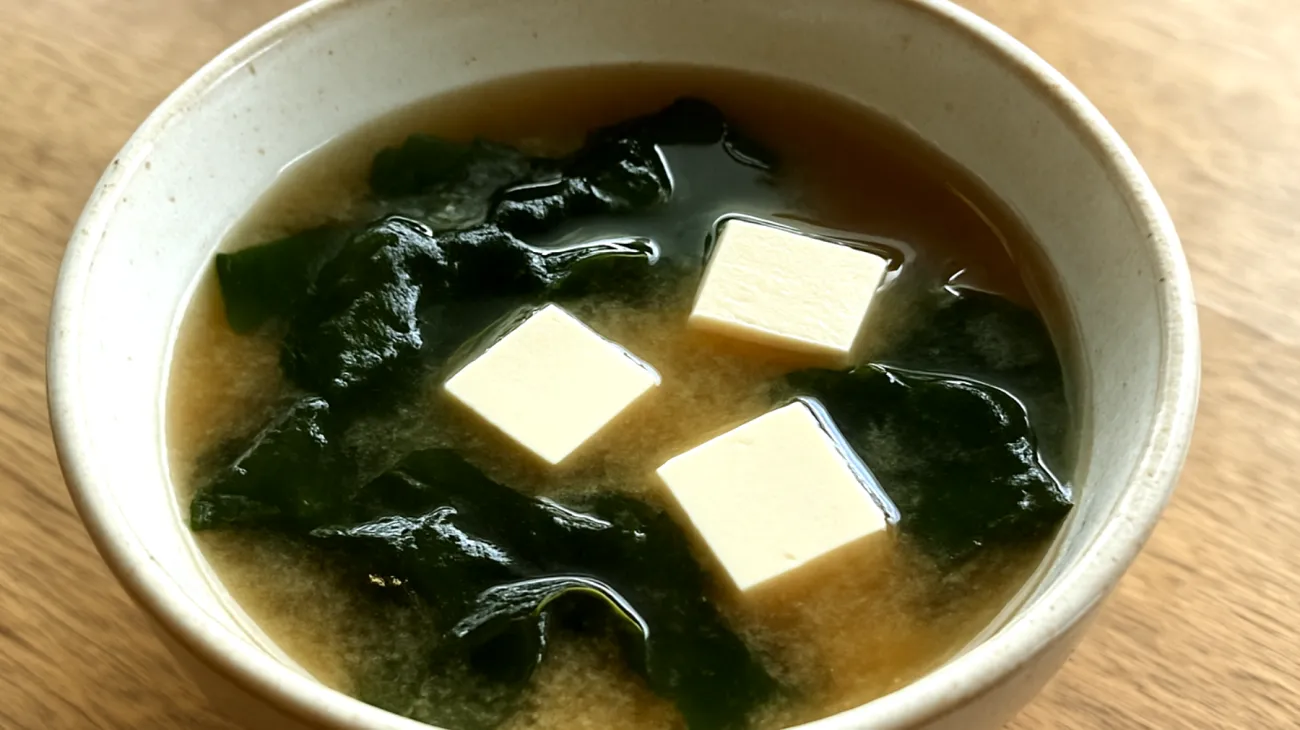The ancient wisdom of Japanese cuisine meets modern nutritional science in a humble bowl that transforms your evening dining experience. Miso soup with wakame seaweed and silken tofu represents far more than a simple appetizer—it’s a carefully orchestrated symphony of nutrients that addresses some of the most pressing challenges facing plant-based eaters today.
The Fermentation Revolution in Your Bowl
Miso paste, the soul of this remarkable soup, undergoes a complex fermentation process lasting months or even years. This traditional method creates a product rich in beneficial bacteria that can positively influence gut health. Fermented foods in Japanese diets support gut microbial diversity and are associated with an increase in beneficial microbes along with improved metabolic markers.
The connection between gut health and serotonin production is well established, with over 90% of the body’s serotonin produced in the gut. Probiotic-rich foods support intestinal health and may influence neurotransmitter production through the gut-brain axis. The beneficial bacteria in miso soup contribute to this crucial process, making your evening meal a foundation for both physical and mental well-being.
Complete Proteins Without Compromise
Silken tofu brings an often-overlooked nutritional advantage to plant-based diets: complete protein containing all nine essential amino acids. Unlike many plant proteins that require careful combining, tofu delivers approximately 8 grams of high-quality protein per 100-gram serving, with an amino acid profile comparable to animal proteins.
The protein quality becomes even more impressive when considered in the context of dinner timing. Evening protein consumption supports overnight muscle repair and regeneration, making this soup an ideal choice for active individuals following plant-based lifestyles. The soft, easily digestible texture of silken tofu ensures minimal digestive stress before bedtime.
Oceanic Minerals That Transform Health
Wakame seaweed introduces a treasure trove of marine minerals often absent from terrestrial plant foods. This remarkable sea vegetable contains exceptional concentrations of iodine, essential for thyroid function and metabolic regulation. A typical serving of dried wakame provides anywhere from 150 to 300% of the recommended daily intake of iodine, depending on seaweed species and growing conditions.
Beyond iodine, wakame delivers substantial amounts of magnesium for muscle relaxation and sleep quality, calcium in well-absorbed forms for bone strength, iron bound to natural chelators for improved absorption, and folate plus vitamin K supporting cardiovascular health. These marine-derived nutrients fill gaps commonly found in land-based plant foods, making wakame an invaluable addition to vegetarian and vegan diets.
The B12 Question
While certain traditional, long-fermented miso varieties may contain small amounts of vitamin B12 produced by bacteria during fermentation, it’s crucial to dispel a common misconception. The amounts are highly variable and rarely sufficient to meet daily needs. Current scientific consensus states that although some fermented plant foods contain traces of B12, only supplementation or fortified foods reliably prevent deficiency in plant-based eaters.

Timing and Temperature for Maximum Benefits
Consuming miso soup warm, rather than boiling hot, may help preserve some heat-sensitive probiotic components. The gentle warmth still aids digestion and supports gastric secretion, helping to prepare your digestive system for the evening’s rest and repair processes.
Nutritionists often recommend consuming light meals 2-3 hours before bedtime for optimal digestion. The tryptophan in tofu, combined with the complex carbohydrates from miso, can support natural melatonin production. Tryptophan serves as a precursor to serotonin, which is then converted to melatonin, promoting restful sleep.
Customization for Enhanced Nutrition
Transform your basic miso soup into a nutritional powerhouse through thoughtful additions. Fresh scallions provide sulfur compounds that support liver detoxification and antioxidant defense, while shiitake mushrooms contribute beta-glucans known to enhance immune system function. These additions also increase the soup’s prebiotic fiber content, feeding beneficial gut bacteria for sustained digestive health.
When selecting miso paste, prioritize low-sodium varieties to maintain the soup’s health benefits without excessive salt intake. White miso offers milder flavors perfect for evening consumption, while red miso provides more intense umami notes and generally higher concentrations of antioxidants from longer fermentation periods.
- Choose organic, unpasteurized miso for maximum probiotic benefits
- Add fresh ginger for anti-inflammatory compounds
- Include sesame oil for healthy fats and enhanced absorption
- Garnish with nori flakes for additional B vitamins
Beyond Basic Nutrition
This seemingly simple soup addresses multiple nutritional gaps simultaneously. The combination of probiotics, complete proteins, marine minerals, and B vitamins creates a comprehensive nutritional profile that supports everything from bone health to cognitive function and metabolic regulation. For plant-based eaters seeking a light yet satisfying dinner option, miso soup with wakame and tofu represents optimal nutritional efficiency.
The synergy of fermented soy, seaweed, and vegetables exemplifies the nutrient diversity that research consistently associates with longevity, disease prevention, and overall well-being. Each warming spoonful delivers targeted nutrition that works harmoniously with your body’s natural rhythms, proving that profound health benefits often come in the most unassuming packages. The traditional ingredients and preparation methods found in this soup have supported Japanese populations for generations, creating a time-tested approach to evening nourishment that modern science continues to validate.
Table of Contents

